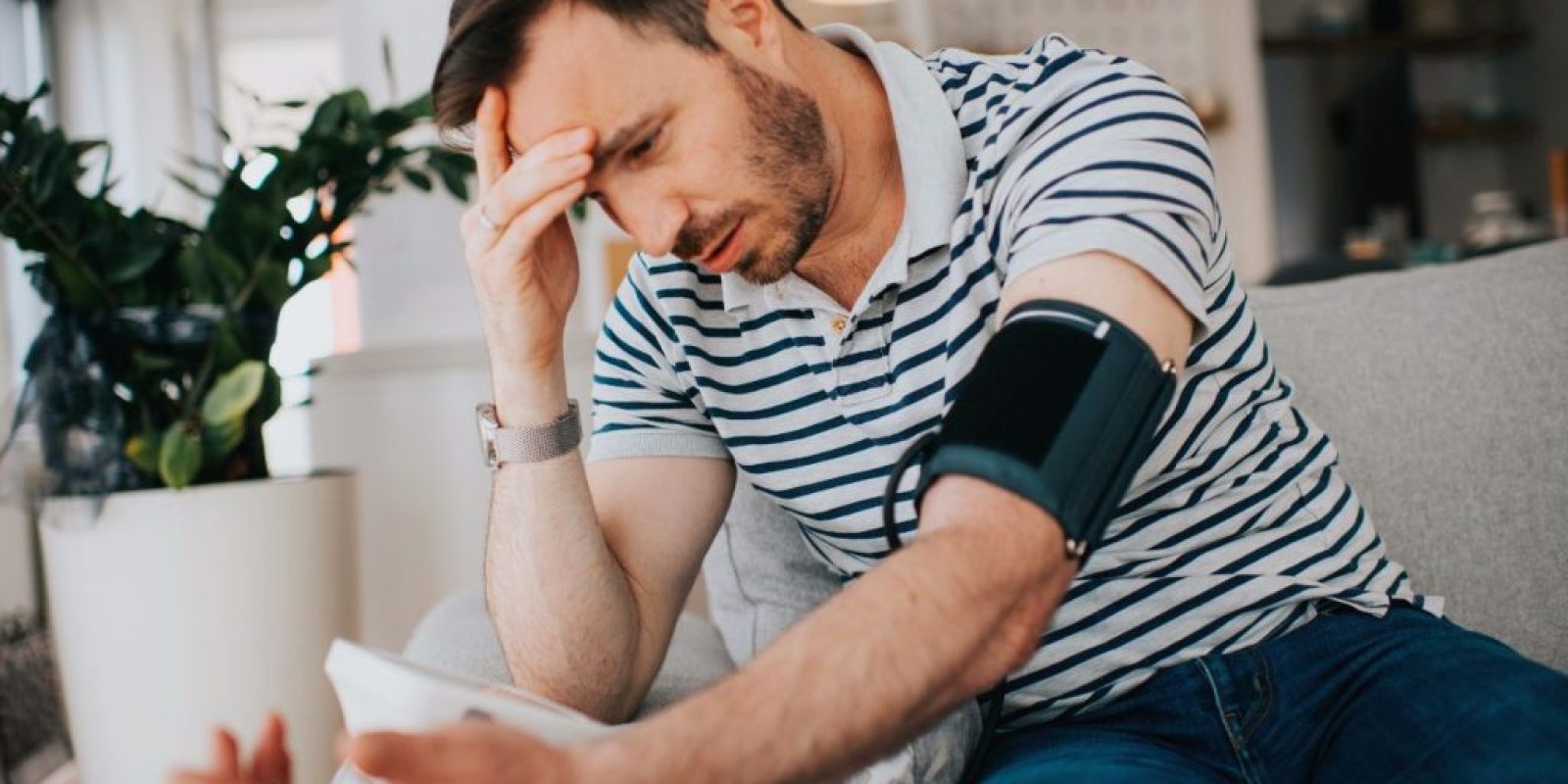Have you noticed your heart racing when you’re stressed?
Anxiety and blood pressure are connected surprisingly. Anxiety can cause a quick rise in your blood pressure.
But, can anxiety cause high blood pressure?
While anxiety doesn’t directly create ongoing high blood pressure, it can harm your heart over time.
These sudden spikes might hurt your blood vessels and organs if they happen often.
This is similar to what chronic high blood pressure does.
It’s smart to grasp how anxiety affects your blood pressure for better stress management and mental health.
In this article, you’ll explore how these two conditions interact and management tips.
Key Takeaways
- Anxiety causes temporary increases in blood pressure
- Chronic anxiety may lead to cardiovascular damage
- Stress management is vital for blood pressure control
- Certain anxiety medications can affect blood pressure
- Lifestyle choices impact both anxiety and blood pressure
- Early treatment improves outcomes for both conditions
Anxiety and Blood Pressure
Anxiety makes your body release stress hormones.
These hormones make your heart beat faster, and blood vessels get smaller.
This raises your blood pressure temporarily.
Anxiety and blood pressure are closely tied and affect many Americans.
About 25 million Americans deal with anxiety.
High blood pressure impacts nearly half of all U.S. adults2.
This is why it’s important to check your blood pressure during panic attacks.
Long-term Effects of Chronic Anxiety
Having anxiety for a long time might make you more likely to have high blood pressure for good.
People with anxiety often do things that can make blood pressure rise, like smoking and drinking a lot2.
Up to 51 percent of people with pulmonary arterial hypertension also have anxiety and panic disorders.
Stress hormones are key in the link between anxiety and blood pressure.
Hormones like cortisol and adrenaline start the “fight or flight” response.
This causes changes in your body that can affect your heart health over time.
| Factor | Short-term Effects | Long-term Consequences |
|---|---|---|
| Anxiety | Temporary blood pressure spikes | Increased risk of hypertension |
| Stress Hormones | Rapid heart rate, narrowed blood vessels | Potential cardiovascular issues |
| Panic Attacks | Acute blood pressure elevation | Possible chronic hypertension |
There’s a two-way link between anxiety disorders and heart health.
Women with past mental health issues have a higher chance of getting high blood pressure3.
It’s important to check your blood pressure regularly and treat anxiety to stay healthy.
Can Anxiety Cause High Blood Pressure?
Anxiety and blood pressure are closely linked.
Even though anxiety doesn’t directly cause ongoing high blood pressure, it can spike a person’s blood pressure temporarily.
Over 40 million U.S. adults face anxiety every year.
And up to 51% of those with pulmonary arterial hypertension might also have anxiety and panic disorders4.
During anxious moments, your body’s fight-or-flight response kicks in.
This can lead to short-term spikes in blood pressure.
These physical reactions include a faster heart rate, sweating, and increased blood pressure5.
If anxiety is frequent for you, repeated spikes can lead to health issues over time.
A strong link exists between intense anxiety and a higher hypertension risk.
In 2015, a review discovered that severe anxiety leads to an increased chance of high blood pressure.
This is compared to those with milder anxiety6.
Anxiety might trigger behaviors that harm your heart health and lead to high blood pressure.
Unhealthy ways of coping with chronic anxiety can indirectly cause hypertension.
These may include smoking, poor sleep, lack of exercise, and too much alcohol.
Such habits can contribute to high blood pressure and other heart issues5.
| Anxiety Management | Blood Pressure Control |
|---|---|
| Deep breathing techniques | Healthy diet |
| Meditation | Regular physical activity |
| Regular exercise | Limited alcohol intake |
| Sufficient sleep | Medication (if prescribed) |
Addressing both anxiety and blood pressure is key.
Early help can make a big difference in outcomes and lower the complications’ risk6.
If severe anxiety symptoms or blood pressure changes keep happening, talk to a doctor.
They can provide the right diagnosis and treatment.
Common Symptoms of Anxiety-Induced Blood Pressure Levels

Anxiety hits your body hard.
Knowing the symptoms helps tell anxiety apart from high blood pressure.
Nearly half of the US adults deal with high blood pressure.
Anxiety is a common issue, affecting about 20% of us7.
You might notice things like:
- Your heart racing
- Sweating
- Not catching your breath
There could also be trembling, feeling tight in the chest, and shaking.
This happens because of stress hormones.
When blood pressure tops 140/90 Hg, treating it cuts the risk of heart issues and death.
Emotional and Psychological Signs
It’s not just your body; anxiety affects your mind, too.
You might worry too much, feel restless, or have difficulty focusing.
These issues, along with irritability and sleeping problems, are all signs.
Bad sleep is bad news for anxiety and high blood pressure.
Getting the right amount of good sleep helps against these problems9.
Difference Between Anxiety and Hypertension Symptoms
While anxiety and high blood pressure might seem similar, they have distinct signs:
| Anxiety Symptoms | Hypertension Signs |
|---|---|
| Rapid onset during stressful situations | Gradual development over time |
| Often accompanied by panic or fear | Usually asymptomatic |
| May include dizziness and tingling | Can cause headaches and vision problems |
| Temporary spikes in blood pressure | Consistently elevated blood pressure readings |
Checking your blood pressure and your mood can lead to the right diagnosis.
Doing 150 minutes of moderate exercise weekly is a tip from the American Heart Association.
It’s good for your blood pressure and anxiety9.
Yes, anxiety isn’t always tied to high blood pressure, but for some, it might.
If you feel these issues last, see a doctor.
They can give you options for getting better.
Lifestyle Choices on Anxiety and Blood Pressure
Your daily habits greatly affect how anxious you feel and your blood pressure.
The American Heart Association describes high blood pressure as 130/80 or more in around half of U.S. Adults.
Changing your lifestyle is key to handling these issues.
1. Walking, swimming, or jogging for 150 minutes a week improves your heart health and reduces stress11,10.
2. Getting enough sleep is very important, too.
Sleeping at least 7 hours each night helps with stress and blood pressure11.
3. It’s also essential to watch what you eat and drink.
Cutting back on alcohol and caffeine can make a big difference.
Caffeine, for example, can briefly raise your blood pressure.
So, keep these things in check10.
4. Don’t underestimate the power of deep breathing and seeing positive images.
They can improve your mood and well-being11.
5. Join support groups.
They can lower your stress and protect your heart11.
Sometimes, you might need more than lifestyle changes.
For some people, therapy or medicines, taken under a doctor’s watch, could be needed.
A study from 2022 found that high diastolic blood pressure might lead to more mental health conditions such as anxiety, worrying, and sadness12.
Remember, even small daily adjustments can greatly affect your mind and body.
Wrapping Up
Understanding how anxiety and blood pressure are connected is important for your health.
If this happens a lot, it can harm your heart and blood vessels over time.
By knowing how anxiety affects your body and taking steps to manage both anxiety and blood pressure, you can stay healthier.
Here are some simple steps you can take:
- Moving your body helps reduce anxiety and keeps your heart healthy.
- Good sleep helps lower stress and keeps your blood pressure normal.
- Eating fruits, vegetables, and whole grains can improve your overall health.
- Deep breathing, meditation, or relaxing hobbies can help reduce anxiety.
If you feel overwhelmed, don’t hesitate to talk to a doctor or therapist. They can offer treatments and support.
FAQ
What is the relationship between anxiety and high blood pressure?
Anxiety doesn’t make high blood pressure long-term. But, it can cause quick rises in blood pressure. These quick rises, if often, can hurt the body similar to long-term hypertension.
How does anxiety affect blood pressure in the short term?
Anxiety makes our body release stress hormones. This makes our heart beat faster and blood vessels smaller, raising blood pressure briefly. You might notice your heart beating fast and your blood pressure rising quickly.
What are the long-term consequences of chronic anxiety on blood pressure?
Chronic anxiety can lead to lasting high blood pressure. This might increase the risk of heart disease. Stress hormones like cortisol and adrenaline are key in this.
Can anxiety medications contribute to high blood pressure?
Yes, some anxiety drugs, like SNRIs, might increase blood pressure.
What are the physical manifestations of anxiety-induced blood pressure spikes?
You might feel your heart racing, start to sweat, or find it hard to catch your breath.
How can I differentiate between anxiety and hypertension symptoms?
Keeping track of your blood pressure and getting psychological check-ups can help. This will make sure you can tell if it’s anxiety or hypertension causing your symptoms.
What lifestyle changes can help manage both anxiety and blood pressure?
There are many lifestyle changes that can help. This includes regular physical activity, good sleep, stress relief like yoga, less alcohol and caffeine, and better diet.
Source Links
- https://www.mayoclinic.org/diseases-conditions/high-blood-pressure/expert-answers/anxiety/faq-20058549 – Can anxiety cause high blood pressure?
- https://health.umms.org/2022/10/27/anxiety-and-high-blood-pressure/ – The Link Between Anxiety and High Blood Pressure
- https://www.ncbi.nlm.nih.gov/pmc/articles/PMC4411016/ – Association between anxiety and hypertension: a systematic review and meta-analysis of epidemiological studies
- https://www.healthline.com/health/anxiety/can-anxiety-cause-high-blood-pressure – Can Anxiety Cause High Blood Pressure?
- https://www.verywellmind.com/can-anxiety-cause-high-blood-pressure-6739934 – Can Anxiety Cause High Blood Pressure?
- https://ibcces.org/learning/what-is-the-link-between-anxiety-and-high-blood-pressure/ – IBCCES Learning Community
- https://www.uclahealth.org/news/article/both-anxiety-and-high-blood-pressure-affect-many-americans – Both anxiety and high blood pressure affect many Americans
- https://www.verywellhealth.com/anxiety-high-blood-pressure-6747055 – The Link Between Anxiety and High Blood Pressure
- https://www.helpguide.org/articles/healthy-living/blood-pressure-and-your-brain.htm – Blood Pressure and Your Brain – HelpGuide.org
- https://www.heart.org/en/health-topics/high-blood-pressure/changes-you-can-make-to-manage-high-blood-pressure/managing-stress-to-control-high-blood-pressure – Managing Stress to Control High Blood Pressure
- https://www.healthline.com/health/anxiety/anxiety-and-diastolic-dysfunction – Anxiety and Diastolic Dysfunction: Is There a Relationship?




